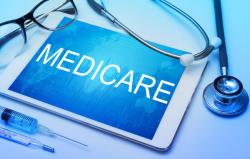© 2026 MJH Life Sciences™ and The Center for Biosimilars - Biosimilars, Health Economics & Insights. All rights reserved.
Dr Andre Harvin Answers How Oncologists Can Work to Expand Access to Biosimilars
Andre Harvin, PharmD, executive director of pharmacy and oncology services at Cone Health, explains how oncologists can work with other stakeholders to expand access to biosimilars and how patients can work with providers and biosimilar manufacturers to address financial challenges.
Andre Harvin, PharmD, executive director of pharmacy and oncology services at Cone Health, explains how oncologists can work with other stakeholders to expand access to biosimilars and how patients can work with providers and biosimilar manufacturers to address financial challenges.
Transcript
What more needs to be done to ensure that oncology and supportive care biosimilars are affordable and accessible for patients with cancer?
Harvin: The affordability and accessibility that biosimilars bring to us is something that cannot be understated. I think one of the challenges sometimes is how it relates to the finances of your overall cancer center. Sometimes there's a lot of misinformation out there. Sometimes it's disinformation as well. We have to understand what the finances are around how expensive medications are, what we charge—whether it be the insurance company or Medicare and Medicaid—and then actually understanding how we're reimbursed. What I've been surprised by in my career is that how few people, sometimes in decision making roles, within oncology don't really have a full grasp of how they're actually reimbursed for medications.
I encourage everyone that's out there listening to actually sit down and ask those questions. You know, bring in your revenue cycle management team, bring in your managed care team. Obviously, bring in your pharmacy team, because there's a lot of things at play here. First, you have to understand how much you're paying for the drug and if there are any rebates or any contractual arrangements that are important. Next is how much you're charging for it. But most importantly, it's how much money is actually coming back in.
When you actually sit down and do that analysis, I think most people will find that biosimilars really affords them a much better financial picture than some of the reference products and that's why it's so critical to really understand the financial implications of biosimilars rather than getting caught up in the previous dogma of more expensive drugs means higher margin. That's not always the truth. And biosimilars has really changed the way we have to approach the finances of health care.
But once we do that, then we also have to think about the accessibility aspect. So, depending on patients insurance, a more expensive drugs may, obviously, decrease their ability to have access to that medication. If they have excessive out-of-pocket [costs], where they have to be charged a percentage of the total charges out-of-pocket, some patients start making decisions based on the cost of their therapy, and that's exactly what we don't want to occur.
So, the other aspect that's really great about having biosimilars and having a number of them out in the market is that every single one of them has their own patient assistance program. And so, if there is that question of the affordability or the accessibility of care, the great thing is you can engage those manufacturers, you can understand what their patient assistance programs are, and you can find ways to work with them to ensure patients have access to those critical medications.



